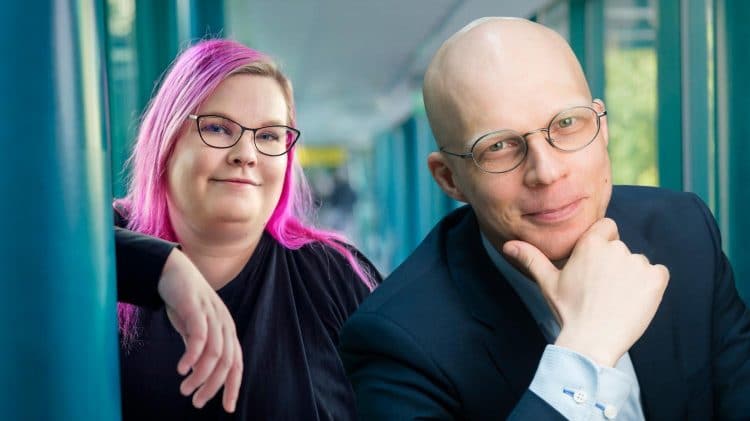
Riding the future train with Ella Peltonen and Sasu Tarkoma: A Conversation
Researcher Ella Peltonen is working in the UBICOMP research group at the University of Oulu and has been closely involved in 6G Flagship since its beginnings. Peltonen focuses on real-time sensor data and machine learning (ML), emphasising real-life problems and solutions to them. Professor Sasu Tarkoma shares his time with the University of Helsinki and 6G Flagship. Tarkoma says that his expertise is focused on the intersection of telecommunications networks, cloud computing and artificial intelligence (AI), with a core focus on 6G research.
Ella Peltonen and Sasu Tarkoma sat down for a virtual conversation with the 6G Waves magazine to discuss their role in the 6G Flagship and their ideas about future development in technology and society.
6G Waves: 6G seems to be all about the intersection, finding where technologies connect?
Peltonen: Everything is integrally connected. A big part of our work is how to bring researchers from AI, ML, network intelligence, software and software platform development to the same table. You can’t live in silos anymore and think that the telecoms guys will take a ready piece of software made by the software guys, and that’s that.
Tarkoma: The game is on for 6G. It means creating the big picture together, not just on a national level but internationally. Many countries are investing heavily into the next generation mobile networks and we have to compete with our expertise, even if we don’t have the same financial resources to pour into it.
Peltonen: I really want to see strong co-operation between the different parties. The theoretically inclined sometimes tend to brush off applications and say they’ll be there down the road. What if we tried to build theory and applications together from the starting point in a best-of-both-worlds kind of way?
Tarkoma: We have to look at the possibilities of 6G as something more than just a bit pipe. Genuine intelligence is built into networks, with privacy-aware sensing and data collection related to sustainability supported by the networks. Radio technology is evolving well; there are excellent results for the next generation of radios. But how do we create new business, new innovation? This would be important in demonstrating the added value of the network.
6G Waves: Technology in itself seems to be intertwined, but the same can be said for the human experience and the problems we face globally, like climate change and its repercussions. How do we keep up with the accelerating pace of it all?
Peltonen: In the previous generations of mobile telecommunications, the focus was always more capacity, efficiency, and functionality. Now the paradigm is changing to dynamic networks capable of maintaining and building themselves and optimizing their resources like energy. 6G research in the Flagship has also made a deep commitment to the U.N. sustainability goals, and a big part of it is achievability. We are moving from urban areas to rural areas.
Tarkoma: An ITU statistic from 2020 said that 85% of the world’s population had access to 4G, and 93% had some type of network access at the end of that year. There’s been a lot of progress in providing telecommunications, but only about 60% of the world’s population has traditional Internet access. The mobile networks count for much more. Access to information should be seen as a fundamental human right and there are a lot of expectations on 6G in that regard.
Peltonen: Digital modelling of the entire world is still yet to come. Our networks cover only inhabited land areas so far. Data collection on a vast scale and processing that data develop solutions to pressing real-world problems is high up on the agenda. Ubiquitous intelligence is what I am focusing on in my research, and it is core research, based on the latest science, that’s going to set the foundation for future applications and, really, the solutions.
6G Waves: It seems that the train is running already, and we need to keep up with it.
Peltonen: Yes, and we are not only running along with it. We are also laying the tracks in front of the engine. We are figuring out where our train is going, which stations it should stop, what material the tracks will be made of, and where to apply the brakes. It takes a moment to figure out what is sustainable for our railroad. We need to build the tracks and navigate the terrain, so we don’t hit a wall.
6G Waves: This train metaphor really paid off. [Laughter all around.]
Tarkoma: It always takes time for technology to mature, and we live in the 10-year cycle of the G’s. This is the time to test out all kinds of ideas for the next generation, good and bad. It’s all learning.
Peltonen: I’m coming back to co-operation. In ten years, I would like to see concrete collaboration. Not just that, yes, we can all sit at the same table, but something that genuinely creates new things for humankind. Social scientists, doctors, engineers, space technologists, economists, legislators, academy, and industry all working to improve all of our lives in an ethical and responsible, sustainable manner.
Tarkoma: The universities are a major factor in this, and we are working to bring in different disciplines to work on shared goals. We still have a long road ahead, but we’re getting there.
The next issue of 6G Waves will be published in December. Stay tuned!
Explore previous issues
Waves Spring 2021 | Waves Autumn 2020 | Waves Spring 2020